Class Actions Against China Grow Despite Foreign Policy Obstacles

WASHINGTON – Law firms and their clients who are joining the growing list of plaintiffs against the Chinese government over the coronavirus outbreak are running up against a foreign policy that could rule out any successful lawsuits.
About a half-dozen class action lawsuits have been filed in federal courts against China.
However, they appear to be overlooking legal recourse through international tribunals, according to a new public policy foundation’s report.
The lawsuits argue that China’s negligent or reckless failure to adequately warn other countries about dangers of the epidemic when it was first noticed last December in the city of Wuhan has endangered millions of people worldwide.
In the United States, the death toll from coronavirus is near 50,000.
Lawsuits against foreign countries must overcome tough standards of the Foreign Sovereign Immunities Act, which bans private legal action unless it falls under rare exceptions, according to legal experts.
One of the experts is former New Jersey Superior Court Judge Andrew Napolitano, who also acts as a legal policy analyst for Fox News.
“At the present time, they don’t have a case because of the Foreign Sovereign Immunity Act [of 1976], which basically says American courts do not have jurisdiction over the behavior of foreign governments and that, of course, would bar nearly any lawsuit against the government of China,” Napolitano said.
Generally, private lawsuits are allowed if a plaintiff’s claim is based on commercial activity performed in the United States by the foreign government. Typical examples are state-sponsored foreign airlines and financial institutions.
Other exceptions could include industrial espionage and thefts of private property during “genocidal takings” by foreign militaries or agents.
A lawsuit filed by the state of Missouri this week tries to cite the commercial activity exception but gives scant evidence the epidemic resulted from China’s business relations in the United States.
The Missouri lawsuit seeks unspecified compensation “for the enormous loss of life, human suffering and economic turmoil experienced by all Missourians from the COVID-19 pandemic that has disrupted the entire world.”
It also accuses China of misleading other countries about how easily the virus can spread, silencing medical personnel who tried to warn others and hoarding medical supplies.
People’s Republic of China officials deny wrongdoing.
“This so-called lawsuit is very absurd and has no factual and legal basis at all,” China Foreign ministry spokesman Geng Shuang said at a daily briefing this week.
Since the outbreak began, China has proceeded in an “open, transparent, and responsible manner” and the U.S. government should “dismiss such vexatious litigation,” he said.
The Trump administration has given no indication it supports the Missouri lawsuit or the private class actions.
If a U.S. class action lawsuit succeeds, it could be worth $1.2 trillion in damages, according to the British conservative public policy foundation the Henry Jackson Society.
A report from the foundation accuses China of intentionally withholding information from the World Health Organization in a way that represents a violation of the International Health Regulations.
The report also said plaintiffs could bypass domestic laws and courts by petitioning international tribunals. They include the World Health Organization, the International Court of Justice, Permanent Court of Arbitration and courts in Hong Kong.






















